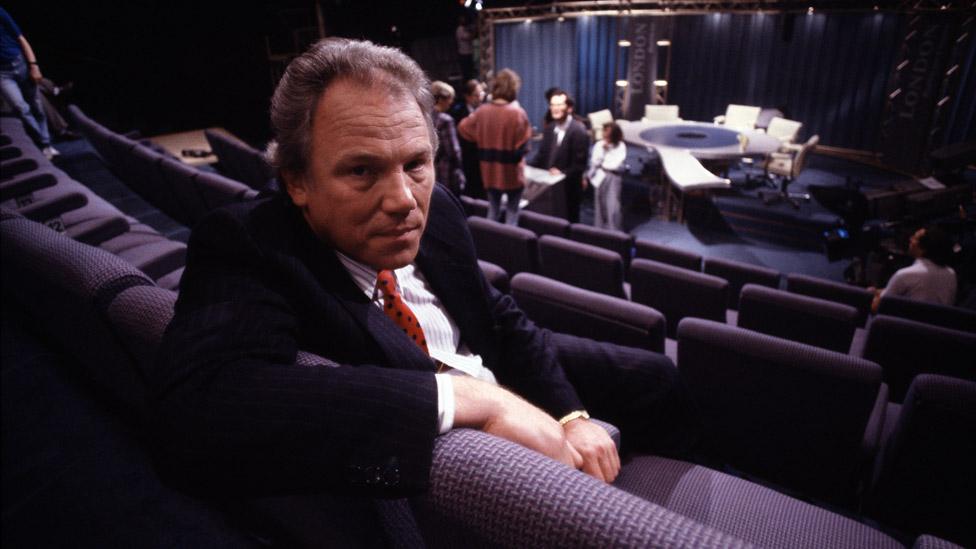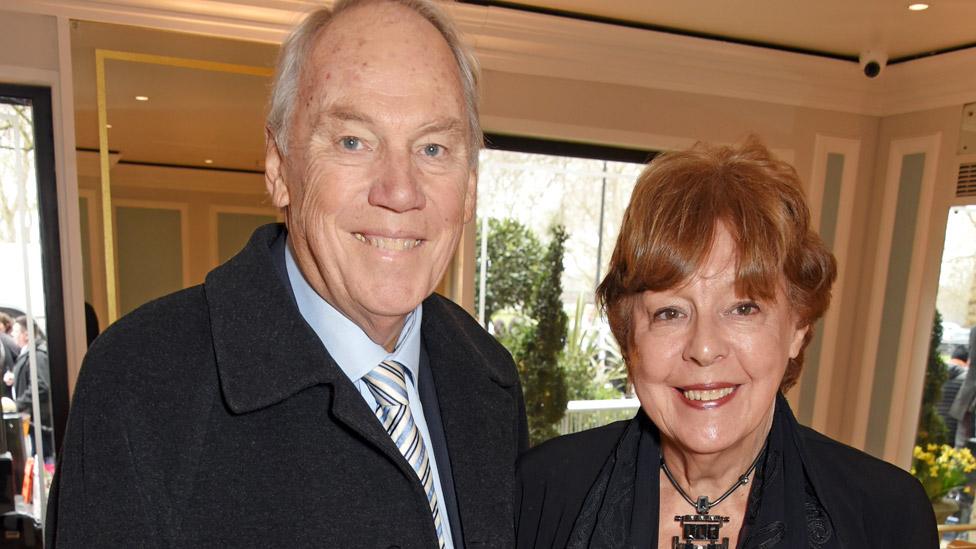Peter Sissons: Former BBC, ITN and Channel 4 newsreader dies at 77
- Published
Peter Sissons announces the resignation of John Major as Tory leader in 1995
Peter Sissons, the former BBC and ITN newsreader and Question Time host, has died at the age of 77.
Sissons joined ITN in the 1960s before moving to the BBC in 1989 to present Question Time and the Six O'Clock News.
BBC director general Tony Hall described him as "one of the great television figures of his time".
The late broadcaster's old Liverpool school friend Sir Paul McCartney called Sissons "a talented news presenter with a great sense of humour".
Allow X content?
This article contains content provided by X. We ask for your permission before anything is loaded, as they may be using cookies and other technologies. You may want to read X’s cookie policy, external and privacy policy, external before accepting. To view this content choose ‘accept and continue’.

The former Beatle wrote on his website: "Dear Peter, my old school mate from the Liverpool Institute (now LIPA) has passed away. It's so sad to hear the news.
"We were in the same year and stayed in touch as time went by and we both followed our separate careers."
He added: "He was a talented news presenter with a great sense of humour. I will miss him but always have fond memories of the time we spent together. My sympathies go out to his family and I send my love to them all."
Tributes also came from such figures as Piers Morgan and Tony Blair, who said he was "a journalist of exceptional talent, commitment and integrity".
Allow X content?
This article contains content provided by X. We ask for your permission before anything is loaded, as they may be using cookies and other technologies. You may want to read X’s cookie policy, external and privacy policy, external before accepting. To view this content choose ‘accept and continue’.

Good Morning Britain host Morgan hailed him as, external "an excellent journalist and TV newsreader, and splendidly combative and amusing man", while BBC presenter Simon McCoy said, external Sissons was "a great journalist and a fine presenter".
Born in Liverpool in 1942, Sissons went to school with John Lennon, George Harrison and Paul McCartney. He studied at Oxford University, but returned to Liverpool to work as a bus conductor in the summer holidays - and later said the experience of dealing with difficult customers prepared him for handling difficult interviewees.
"He was fantastic company... loved a good gossip" - Huw Edwards pays tribute to Sissons
His journalistic career began when he joined ITN in 1964 as a writer, and he became a reporter three years later.
As a foreign correspondent, he was wounded by gunfire in Biafra in 1968. He was later promoted to ITN's news editor and then industrial editor before becoming a presenter of ITN's News at One in 1978.
When Channel 4 was launched in 1982, he was chosen to present their nightly news programme, and during his time as anchor, Channel 4 News won three consecutive Bafta Awards.
In 1989, he interviewed the Iranian ambassador about the fatwa issued to author Salman Rushsdie, external, and admitted in his autobiography that he found it "very hard" to keep his anger from showing. That interview resulted in the fatwa being extended to him, meaning he and his family needed 24-hour protection.

He took over from Robin Day as presenter of Question Time
After joining the BBC later that year, he took over from Sir Robin Day as host of Question Time, which he hosted for four years, and also went on to present the Nine O'Clock News and 10 O'Clock News.
"He was a gold standard broadcaster," said BBC News presenter Huw Edwards. "For a decade or more, he was the face of Channel 4 News, and he really was an outstanding interviewer and presenter.
"He was very supportive when I started off as a presenter, he couldn't have been more generous, and I think that was a reflection of him as a man as well."

The Six O'Clock News line-up in 1989: Moira Stuart, Sissons and Anna Ford
In 2002, he faced criticism for wearing a burgundy-coloured tie rather than the customary black when breaking the news of the Queen Mother's death.
When he was moved to BBC News 24 in 2003, he accused the corporation of ageism. "Ageism is still the BBC's blind spot. Yet it is blindingly obvious that maturity goes with grey hairs," he said.
Sissons retired from broadcasting in 2009. Two years later, he published an autobiography in which he criticised the BBC for having what he saw as a left-wing bias.
Paying tribute, Lord Hall said: "Peter Sissons was one of the great television figures of his time - as an interviewer, presenter and world-class journalist. During his distinguished career he was one of the most recognisable and well-respected faces of television news.
"He was always a great person to be with and to work with. He will be missed by his many friends and colleagues and our thoughts are with his family."
Allow X content?
This article contains content provided by X. We ask for your permission before anything is loaded, as they may be using cookies and other technologies. You may want to read X’s cookie policy, external and privacy policy, external before accepting. To view this content choose ‘accept and continue’.
Allow X content?
This article contains content provided by X. We ask for your permission before anything is loaded, as they may be using cookies and other technologies. You may want to read X’s cookie policy, external and privacy policy, external before accepting. To view this content choose ‘accept and continue’.
Allow X content?
This article contains content provided by X. We ask for your permission before anything is loaded, as they may be using cookies and other technologies. You may want to read X’s cookie policy, external and privacy policy, external before accepting. To view this content choose ‘accept and continue’.
Allow X content?
This article contains content provided by X. We ask for your permission before anything is loaded, as they may be using cookies and other technologies. You may want to read X’s cookie policy, external and privacy policy, external before accepting. To view this content choose ‘accept and continue’.

Returning to his home city, he sat on the Hillsborough Independent Panel, which published a report into the 1989 football stadium disaster in 2012.
The chairman of the panel, the former Bishop of Liverpool, James Jones, said: "Peter made a unique and outstanding contribution to the Hillsborough Independent Panel. His advice made a huge difference to our work. I know he felt both honoured and proud to serve the city."
A statement from Sissons' management company said he "died peacefully" in Maidstone Hospital in Kent on Tuesday.
"His wife and three children were with him and wish to pass on their thanks to the hospital staff," it added.

Pictured with wife Sylvia in March 2018

Follow us on Facebook, external, or on Twitter @BBCNewsEnts, external. If you have a story suggestion email entertainment.news@bbc.co.uk, external.